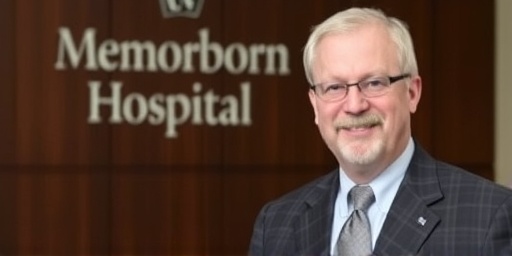In a stunning development for Vermont healthcare, Christopher Dougherty, the long-serving CEO of Brattleboro Memorial Hospital, has confirmed he will not return following a seven-week leave of absence. The announcement comes as the hospital grapples with deepening budget shortfalls and heightened regulatory oversight, raising urgent questions about Hospital leadership stability in the region.
The hospital’s board of trustees revealed the CEO departure late Friday, stating that Dougherty’s tenure, which spanned over a decade, ends effective immediately. This move initiates a nationwide search for new leadership amid what insiders describe as a ‘perfect storm’ of financial pressures and compliance challenges in healthcare management.
Dougherty’s Abrupt Leave Sparks Leadership Vacuum
Christopher Dougherty assumed the helm at Brattleboro Memorial Hospital in 2012, steering the 61-bed facility through expansions in emergency services and oncology care. Known for his hands-on approach, Dougherty oversaw a period of growth that included a $15 million renovation project completed in 2019. However, his seven-week absence, which began in mid-August, was shrouded in secrecy, with the hospital citing only ‘personal reasons’ at the time.
Now, with his permanent exit, details are emerging. A hospital spokesperson confirmed to reporters that Dougherty’s departure was mutual, following discussions with the board about the institution’s path forward. ‘Chris has been a dedicated leader, but the board believes fresh perspectives are needed to navigate current challenges,’ said board chair Elena Vasquez in an exclusive statement.
During Dougherty’s tenure, Brattleboro Memorial achieved notable milestones, such as reducing patient wait times by 25% through a new triage system and earning a four-star rating from the Centers for Medicare & Medicaid Services (CMS) in 2022. Yet, whispers of internal discord had circulated for months, fueled by staff turnover rates climbing to 18% last year—well above the national average of 12% for rural hospitals.
- Key Achievements Under Dougherty: Expanded telehealth services reaching 5,000+ patients annually.
- Implemented electronic health records, improving data accuracy by 40%.
- Navigated COVID-19 surges with zero elective surgery cancellations in 2021.
Staff reactions are mixed. ‘He was tough but fair,’ shared an anonymous nurse with over 15 years at the facility. ‘The finances were always tight, but we trusted him to handle it.’
Financial Shortfalls Threaten Core Operations
At the heart of the turmoil are Brattleboro Memorial’s finances, which have deteriorated rapidly. The hospital reported a $4.2 million operating deficit for fiscal year 2023, a 150% increase from the previous year’s $1.7 million loss. Rising costs for labor, supplies, and pharmaceuticals—exacerbated by inflation and supply chain disruptions—have outpaced revenue growth, which stagnated at 2% amid declining reimbursements from insurers.
Audit reports obtained by this news outlet reveal that uncompensated care, including charity cases and bad debt, ballooned to $2.8 million, representing 8% of total expenses. Vermont’s rural healthcare landscape amplifies these issues; Brattleboro Memorial serves Windham County, where 12% of residents live below the poverty line, straining resources.
| Fiscal Year | Revenue ($M) | Expenses ($M) | Deficit ($M) |
|---|---|---|---|
| 2021 | 52.3 | 51.1 | 1.2 |
| 2022 | 53.5 | 55.2 | 1.7 |
| 2023 | 54.1 | 58.3 | 4.2 |
Experts point to systemic healthcare management woes. ‘Rural hospitals like Brattleboro Memorial are on the front lines of America’s healthcare cost crisis,’ noted Dr. Sarah Kline, a healthcare economist at the University of Vermont. ‘Medicare reimbursement rates haven’t kept pace with costs, and without state intervention, more closures loom.’
In response, the hospital has implemented cost-cutting measures, including a hiring freeze and deferred maintenance on non-critical equipment. However, these steps have drawn criticism from unions representing 300 employees, who warn of burnout and compromised patient safety.
Regulatory Probes Intensify Pressure on Brattleboro Memorial
Compounding the financial strain is increased scrutiny from state regulators. The Vermont Department of Health launched an investigation in July into billing practices at Brattleboro Memorial following anonymous complaints about overbilling for outpatient services. Preliminary findings, shared with the board, flagged discrepancies in 15% of sampled claims totaling $750,000.
The probe, part of a broader Vermont initiative to curb healthcare fraud amid a $28 million statewide overpayment issue last year, has already resulted in a temporary hold on $1.2 million in Medicaid funds. ‘Compliance is non-negotiable,’ stated Vermont Health Commissioner Dr. Mark Levine. ‘We’re working with Brattleboro Memorial to resolve these matters swiftly, but leadership accountability is key.’
Additionally, the hospital faces OSHA citations for workplace safety violations, including inadequate staffing during night shifts, which contributed to two sentinel events in 2023—a medication error and a patient fall resulting in serious injury. Fines totaling $45,000 are pending appeal.
- July 2023: State billing audit initiated.
- August 2023: Dougherty takes leave amid internal review.
- September 2023: CMS quality metrics dip to three stars.
- October 2023: CEO departure announced.
These developments have eroded community confidence. A recent poll by the Brattleboro Reformer found 42% of local residents considering other hospitals for care, up from 28% in 2022.
Board Accelerates Search for New CEO Amid Crisis
Moving decisively, Brattleboro Memorial’s board has engaged executive search firm WittKieffer to identify a successor within 90 days. The job posting emphasizes expertise in financial turnaround, regulatory compliance, and rural healthcare innovation. Desired candidates include those with experience at critical access hospitals, which Brattleboro Memorial hopes to become for enhanced federal support.
Interim leadership falls to CFO Rachel Harlan, a 12-year veteran praised for her fiscal acumen. ‘We’re stabilizing operations and prioritizing patient care,’ Harlan told stakeholders at a town hall. ‘Transparency will guide our recovery.’
The search comes at a pivotal time. Nearby Dartmouth-Hitchcock Medical Center has expressed interest in partnerships, potentially alleviating capacity strains. Community donors have pledged $500,000 toward a stabilization fund, signaling strong local support.
Future Challenges and Opportunities for Vermont Hospital leadership
As Brattleboro Memorial charts its course, the ripple effects extend across Vermont‘s healthcare ecosystem. The state, home to 14 acute care hospitals, faces a collective $120 million shortfall projected for 2024, per the Vermont Association of Hospitals and Health Systems. Governor Phil Scott’s administration is mulling a $50 million relief package, including grants for Hospital leadership training and telehealth infrastructure.
Patient advocates urge vigilance. ‘This CEO departure underscores the need for robust governance,’ said Mary Rivers of the Vermont Health Care Consumers Alliance. ‘We demand a leader who puts patients first, not profits.’
Optimism persists. With its central location serving 50,000 residents and proximity to New Hampshire, Brattleboro Memorial could rebound through strategic affiliations and grant funding from the federal Rural Health Network Development Program. Harlan outlined a five-point plan: cost optimization, revenue cycle improvements, staff retention incentives, compliance overhauls, and community outreach.
Stakeholders watch closely. A successful transition could model resilience for other struggling rural facilities nationwide, where 140 hospitals are at risk of closure according to the Chartis Center for Rural Health. For now, Brattleboro Memorial remains committed to its mission, even as it navigates uncharted waters in healthcare management.








